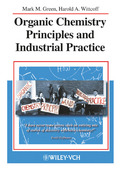Organic Chemistry Principles and Industrial Practice

1. Edition July 2003
XX, 321 Pages, Softcover
166 Pictures
5 tables
Textbook
Short Description
All students of organic chemistry must learn reaction mechanisms, theory, and principles. But what is the relevance of this knowledge? Here at last, Mark M. Green and Harold A. Wittcoff have written a unique textbook that connects the principles of organic chemistry to the practice of industry. The book places industrial chemistry in a historical context, provides valuable otherwise inaccessible information and includes anecdotes from the authors' vast experience. This text intended to be used together with one of the excellent undergraduate organic chemistry texts or standing alone for more advanced students is a must-have for every student, lecturer, and teacher of organic chemistry.
Nylon, plexiglas, epoxy resin, and Elmer's glue; dynamite, rubber tires, and spandex. These are a few among the multitude of industrial products produced using the principles of organic chemistry, principles that are often taught to students without reference to the commercial and practical importance of the subject. The marvelous theoretical principles on which organic chemistry is based are therefore often not fully appreciated by students of this subject. Organic chemistry can appear dry, meaningless, and seemingly irrelevant.
In this textbook, designed to be used in conjunction with classic texts of organic chemistry at the undergraduate level, or standing alone for more advanced students, two experts, M. M. Green and H. A. Wittcoff bring the principles and the practice together. Written for students, and also giving much information that could be used to enhance teaching of the subject, the book, presented in ten concise chapters, combines important industrial processes with the principles of organic chemistry. The result is a source of otherwise barely accessible information. In addition, personal anecdotes from the authors' vast experience make this a fascinating and indispensable textbook for everyone wishing to enhance the appreciation of this subject.
"I have never come across such an enticing mix of stories of discovery with basic chemistry!"
Roald Hoffmann
Cornell University
"Simply put, this book is a gem. The chemistry described is rigorous but the warm, humorous, and conversational writing style makes the book a joy to read."
Dasan M. Thamattoor
Colby College
"This is a unique, fascinating book that bridges organic chemistry principles with chemical industrial applications. The story telling style make the reading/learning experience extremely enjoyable."
Qiao-Sheng Hu, College of Staten Island, City University of New York
How Petroleum is converted into Useful Materials: Carbocations and Free Radicals are the Keys.
Polyethylene, Polypropylene and the Principles of Stereochemistry
The Central Role of Electrophilic Aromatic Substitution
From Nucleophilic Chemistry to Crosslinking, with a Side Trip to Glycerol, in the Synthesis of Commercially Important Plastics
The Nylon Story
Competition for the Best Industrial Synthesis of Methyl Methacrylate
Natural Rubber and Other Elastomers
Ethylene and Propylene: Two Very Different Kinds of Chemistry
The Demise of Acetaldehyde: A Story of How the Chemical Industry Evolves.
Doing Well by Doing Good
Study Guide Problems for each Chapter
James A. Moore
Rensselaer Polytechnic Institute
"This very interesting book is going to find a unique place in the repertoire of organic textbooks."
James Canary
New York University
"Simply put, this book is a gem. The chemistry described
is rigorous but the warm, humorous, and conversational writing style makes the book a joy to read."
Dasan M. Thamattoor
Colby College
"I have never come across such an enticing mix of stories of discovery with basic chemistry!"
Roald Hoffmann
Cornell University
"This is a highly original book filling an obvious need."
Herbert Morawetz
Polytechnic University
"This book is a delightful contribution to the field of organic chemistry that offers a useful pedagogical approach."
Pedro Cintas, Facultad de Ciencias-UEX Badajoz, Spain
"What an excellent read! The book, intended for organic chemistry students, is in the style of the first books on organic chemistry by Isaac Asimov which impressed me as a teenager in the 1960´s. It makes the discovery of new chemicals and processes seem exciting, and emphasises the importance of academic understanding in the development of the chemical industry. (...) The book is full of interesting anecdotes, often related to serendiptious discoveries. But, as Louis Pasteur said, "Chance favours the prepared mind". (...) One interesting story on the cracking of petroleum and the subsequent build up of coke deposits relates to a father who was so obsessed with the subject that he called his son Carbon; Carbon then named his own daughters Methyl and Ethyl. In my opinion, any father who saddles his children with such names might be regarded es a well known arsenic heterocycle!
In conclusion, all organic chemists should read this book for pleasure, not just to learn new knowledge. I hope the authors can be persuaded to write a second volume which covers the fine chemicals industry."
Organic Process Research & Development, Dr. Trevor Laird
"This is a unique, fascinating book that bridges organic chemistry principles with chemical industrial applications. The story telling style make the reading/learning experience extremely enjoyable."
Qiao-Sheng Hu, College of Staten Island, City University of New York
"This is a great book to have on one's shelf. It's interesting to read and useful for teaching at a variety of levels."Chemical & Engineering News
"They (authors) also provide insight on how the well-being of corporate enterprise can, through a deep understanding of chemistry, complement the well-being of society and the global environment."
C & EN, July 19, 2004
"...a well-structured, easy-to-read introduction to the principles of organic chemistry with a new didactic approach ... offers valuable and new ideas..."
Chimie Nouvelle, Vol.23, No.88, March 2005
"As a supplement to teaching, this book is excellent. ... In any case, don't wait, Green and Wittcoff is a great book to have on the shelf now."
Angewandte Chemie I.E., Vol.43/No.47, 2004


